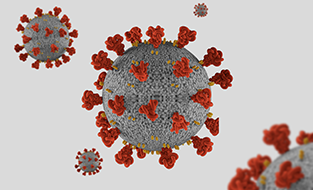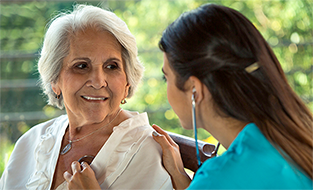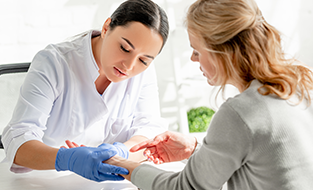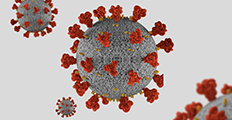Home - pdb
New investigational treatments are closer than you think
Register with ICON and our clinical research specialists will work to match you with nearby studies that may be an option for your medical condition, while providing close care and monitoring at no cost.
Sign up to match with a clinical research study


Advancing science together
Since our founding in 1990, ICON's mission has been to help accelerate the development of drugs and devices that save lives and improve quality of life.
We work with doctors, researchers and patients around the world. Together, we can help find therapies to prevent and treat conditions and diseases.
Whether you want to access investigational medications for your medical condition or volunteer to make a difference, there may be a place for you in clinical research with ICON.
Key conditions with current and upcoming studies

COVID-19 (Coronavirus)
Researchers are working quickly to study COVID-19, its spread, prevention and treatment. With the world facing a pandemic, healthy volunteers and patients who have recovered from the virus are needed for clinical studies to help develop new vaccines and medications to fight the virus.

Eczema (Atopic Dermatitis)
Eczema is a common allergic skin condition that can cause a skin rash that is often itchy, red or scaly in appearance. Currently, there is no cure for eczema, and treatments focus on symptom management and trigger avoidance. Register with ICON to match with eczema research studies.

Bullous Pemphigoid
Bullous pemphigoid is a rare skin condition most common in older adults. It can cause large fluid-filled blisters to form on the skin, often near joints and areas where the body bends, and may also cause mouth sores. Register with ICON to match with bullous pemphigoid studies.

Eczema (Atopic Dermatitis)
Eczema is a common allergic skin condition that can cause a skin rash that is often itchy, red or scaly in appearance. Currently, there is no cure for eczema, and treatments focus on symptom management and trigger avoidance. Register with ICON to match with eczema research studies.

Bullous Pemphigoid
Bullous pemphigoid is a rare skin condition most common in older adults. It can cause large fluid-filled blisters to form on the skin, often near joints and areas where the body bends, and may also cause mouth sores. Register with ICON to match with bullous pemphigoid studies.

Scleroderma (Systemic Sclerosis)
Scleroderma is a chronic, auto-immune disease that can cause scarring and damage to the skin and other organs. With no cure yet, current treatments may help relieve symptoms and slow disease progression. Register with ICON to match with scleroderma studies.

Bullous Pemphigoid
Bullous pemphigoid is a rare skin condition most common in older adults. It can cause large fluid-filled blisters to form on the skin, often near joints and areas where the body bends, and may also cause mouth sores. Register with ICON to match with bullous pemphigoid studies.

Scleroderma (Systemic Sclerosis)
Scleroderma is a chronic, auto-immune disease that can cause scarring and damage to the skin and other organs. With no cure yet, current treatments may help relieve symptoms and slow disease progression. Register with ICON to match with scleroderma studies.

Alopecia
Hair loss, or alopecia, affects men and women and can have a profound effect on one's appearance and self-esteem. Causes include medical conditions, trauma and genetics. Register with ICON to match with alopecia studies.

Scleroderma (Systemic Sclerosis)
Scleroderma is a chronic, auto-immune disease that can cause scarring and damage to the skin and other organs. With no cure yet, current treatments may help relieve symptoms and slow disease progression. Register with ICON to match with scleroderma studies.

Alopecia
Hair loss, or alopecia, affects men and women and can have a profound effect on one's appearance and self-esteem. Causes include medical conditions, trauma and genetics. Register with ICON to match with alopecia studies.

Psoriasis
Psoriasis is an auto-immune disease that causes skin cells to grow rapidly, creating raised plaques or scales on the body. There is no cure for psoriasis, but researchers continue to investigate new treatments. Register with ICON to match with psoriasis research studies.

Alopecia
Hair loss, or alopecia, affects men and women and can have a profound effect on one's appearance and self-esteem. Causes include medical conditions, trauma and genetics. Register with ICON to match with alopecia studies.

Psoriasis
Psoriasis is an auto-immune disease that causes skin cells to grow rapidly, creating raised plaques or scales on the body. There is no cure for psoriasis, but researchers continue to investigate new treatments. Register with ICON to match with psoriasis research studies.

Studies for Other Conditions and Healthy Volunteers
There are many more studies actively enrolling patients with other conditions as well as healthy volunteers. Register with ICON to see if you are a match and receive notifications when new studies open up near you.

Psoriasis
Psoriasis is an auto-immune disease that causes skin cells to grow rapidly, creating raised plaques or scales on the body. There is no cure for psoriasis, but researchers continue to investigate new treatments. Register with ICON to match with psoriasis research studies.

Studies for Other Conditions and Healthy Volunteers
There are many more studies actively enrolling patients with other conditions as well as healthy volunteers. Register with ICON to see if you are a match and receive notifications when new studies open up near you.

COVID-19 (Coronavirus)
Researchers are working quickly to study COVID-19, its spread, prevention and treatment. With the world facing a pandemic, healthy volunteers and patients who have recovered from the virus are needed for clinical studies to help develop new vaccines and medications to fight the virus.

Studies for Other Conditions and Healthy Volunteers
There are many more studies actively enrolling patients with other conditions as well as healthy volunteers. Register with ICON to see if you are a match and receive notifications when new studies open up near you.

COVID-19 (Coronavirus)
Researchers are working quickly to study COVID-19, its spread, prevention and treatment. With the world facing a pandemic, healthy volunteers and patients who have recovered from the virus are needed for clinical studies to help develop new vaccines and medications to fight the virus.

Eczema (Atopic Dermatitis)
Eczema is a common allergic skin condition that can cause a skin rash that is often itchy, red or scaly in appearance. Currently, there is no cure for eczema, and treatments focus on symptom management and trigger avoidance. Register with ICON to match with eczema research studies.

COVID-19 (Coronavirus)
Researchers are working quickly to study COVID-19, its spread, prevention and treatment. With the world facing a pandemic, healthy volunteers and patients who have recovered from the virus are needed for clinical studies to help develop new vaccines and medications to fight the virus.

Eczema (Atopic Dermatitis)
Eczema is a common allergic skin condition that can cause a skin rash that is often itchy, red or scaly in appearance. Currently, there is no cure for eczema, and treatments focus on symptom management and trigger avoidance. Register with ICON to match with eczema research studies.

Bullous Pemphigoid
Bullous pemphigoid is a rare skin condition most common in older adults. It can cause large fluid-filled blisters to form on the skin, often near joints and areas where the body bends, and may also cause mouth sores. Register with ICON to match with bullous pemphigoid studies.

Scleroderma (Systemic Sclerosis)
Scleroderma is a chronic, auto-immune disease that can cause scarring and damage to the skin and other organs. With no cure yet, current treatments may help relieve symptoms and slow disease progression. Register with ICON to match with scleroderma studies.

Alopecia
Hair loss, or alopecia, affects men and women and can have a profound effect on one's appearance and self-esteem. Causes include medical conditions, trauma and genetics. Register with ICON to match with alopecia studies.

Psoriasis
Psoriasis is an auto-immune disease that causes skin cells to grow rapidly, creating raised plaques or scales on the body. There is no cure for psoriasis, but researchers continue to investigate new treatments. Register with ICON to match with psoriasis research studies.

Studies for Other Conditions and Healthy Volunteers
There are many more studies actively enrolling patients with other conditions as well as healthy volunteers. Register with ICON to see if you are a match and receive notifications when new studies open up near you.
Benefits of participating in a clinical research study:
Chance to access otherwise unavailable investigational medications that may be an option for your condition
Receive close study-related care and monitoring by a study doctor at no cost
Help develop new treatments and make a positive impact on the health of patients
Receive reimbursement for your time and travel costs

Am I eligible to participate in clinical research studies?
ICON supports many types of research studies, including those for patients with specific medical conditions and others for healthy volunteers. When you sign up with ICON to match with current or future studies, our clinical research specialists will collect high-level medical information from you to determine your eligibility for individual studies.
What to Expect
When you sign up for the free ICON Study Match program, clinical research specialists will review your information and inform you of studies you may be eligible for. When we find a match, ICON or the local study doctor's office may contact you for further screening. You may also be invited to complete surveys or participate in focus groups.
When you enroll in a study, you will learn study details, have a chance to ask questions, and be asked to provide written, informed consent. Every study has different requirements, including how and where you receive care and how many and how long study visits will be. All study participants receive regular study-related medical attention and are closely observed for safety concerns.


